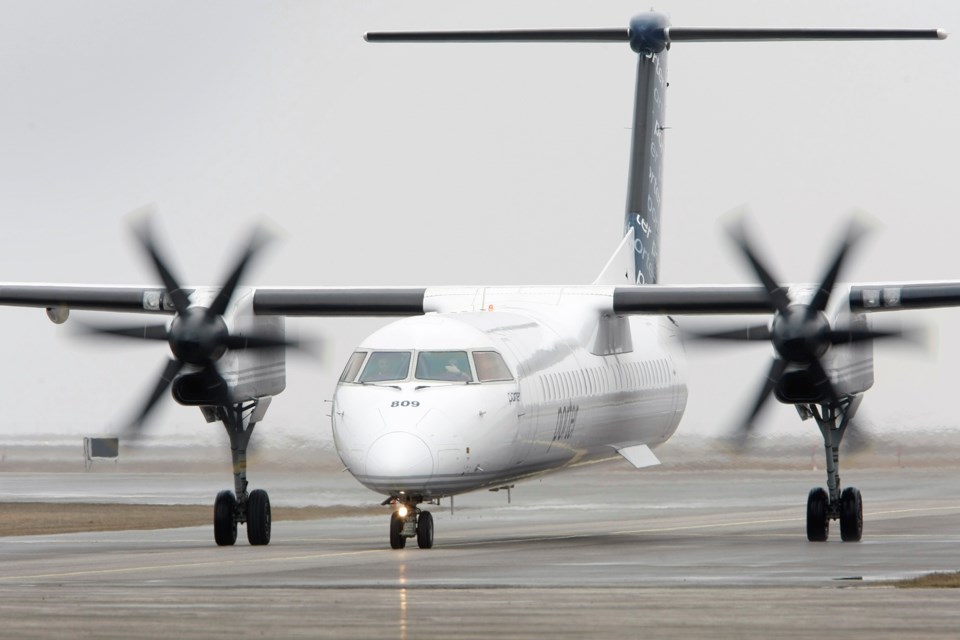Airports did their part during the height of the pandemic to slow the spread of COVID-19. Now, the senior management at four Northern Ontario airports are asking the federal government to return the favour and continue to support them while the sector recovers.
Terry Bos, CEO of Sault Ste. Marie Airport, is among the four airport managers who recently signed a letter to federal cabinet ministers, titled: New Investment in Regional Air Transportation.
“It’s not a matter of disparity; the entire industry is hurting and left dangling throughout the pandemic. A lot of other countries provided cash assistance to airlines and airports. Our airlines never really got that support,” said Bos in a telephone interview.
The letter calls on Canada’s ministers of tourism, FedNor and transportation to ensure airports have the funding needed to continue recovering after the effects of the pandemic. It follows similar letters penned by provincial and national bodies that oversee airports in Canada.
This letter was signed by senior management at Sault Ste. Marie Airport, North Bay Airport, Greater Sudbury Airport and Timmins Airport.
“We just thought we would take a chance, just the four of us in the northeast, and see if we can get any traction or assistance,” said Bos.
Airports across the country received two years of funding through the Regional Air Transportation Initiative to assist in keeping them afloat when traffic levels hit a standstill.
That funding, as well as wage subsidies and infrastructure funding made available during the pandemic’s first years, have now expired.
“We knew the recovery was going to be three to five years; it wasn’t going to be ‘two years and we’re back on our feet,’” said Bos. “That money came in and helped us to stay out of deficits for those two years, but because we never got back to the number of passengers we were at before the pandemic, it’s obviously a very tight situation.”
The entire airline industry and all of its players had to rapidly contract to survive the pandemic, Bos said, and two years of funding was not enough to do everything that needed to be done to foster a full recovery.
“In order to ramp back up there is a lot of training and time, and with the aircraft there is a lot of service that needs to be done if they were, basically, parked for a period of time, so you can’t just flip a light switch and bring everything back on,” he said.
Aside from that, there is the ever-present issue of inflation, especially when it comes to fuel costs.
“We use a lot of fuel to plow and maintain runways and our roads,” said Bos. “The inflation has been a factor in our industry, just as it has with everyone else.”
Although the vacation travel industry has mostly rebounded, Bos said family travel and especially business travel are still not where they were pre-pandemic.
“We have been able to recover up to 80 per cent here in February, but that recovery has been through the leisure travel in the summer and now though Sunwing in the winter, but we are still lacking the business and government travel, which was a big part of our travel back then [pre-pandemic],” said Bos.
“Some of the larger airports have seen their numbers come back, but a lot of the regional airports are still hurting, he added.
Currently in Sault Ste. Marie, Air Canada provides two flights a day and Porter Airlines has scaled back from three per day to two.
Without the funding, Bos said airports would need to increase fees, costs which will trickle down to the customer and negatively affect the efforts being made toward recovery.
“We want to keep our fees in line, and that’s where this funding would help because at the end of the day, the customer [airline passenger] pays for whatever the costs are going to be,” said Bos. “If we can keep the fees low — and therefore the airfares low — we are hoping it will stimulate back the growth we used to have.”
“We don’t want to create any issues that will actually slow down the rebound of bringing back that service to Sault Ste. Marie and this funding will help keep our fees from going up,” he added.
— SooToday




